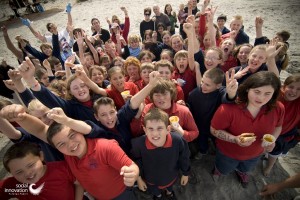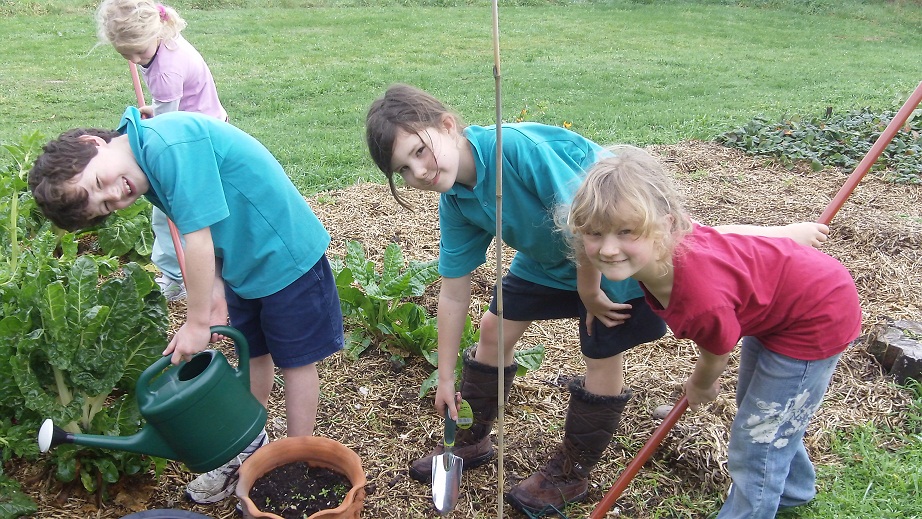Christchurch: A food revolution from the ground up
by Steve Carter
Growing a better future.
That’s how the ‘Garden To Table’ website describes what their scheme aims to achieve. Rooted in the work of the Australian cook Stephanie Alexander’s Kitchen Garden Program, the New Zealand affiliate was started in 2008 by New Zealand food writer and cook Catherine Bell.
The philosophy is simple: change the way children approach and think about food. Diamond Harbour School is the first school in the South Island to participate in theprogramme and Principal Eddie Norgate is enthusiastic about the opportunities that stem from their involvement. “It’s about healthy eating and it’s about the community,” he says, “but the main thing I see out of it is the learning.”
The school already runs what Eddie describes as a “mini version” of the project. They have a small garden on the school grounds and, once a week, parents prepare a meal for the whole school using garden-fresh produce that has been grown on site. As Eddie sees it, “The main focus is on them being able to prepare and share and eat a meal together.”
There may have been some typical resistance from kids at some of the ‘exotic’ food that was being presented to them, but this apparently soon passed, their own direct inclusion in the process being an important eye-(and mouth-)opener. And at only $1 each for a fresh, healthy meal, it is perhaps unsurprising that, on a good day, the scheme will attract 85% take-up among the pupils.
Now, with an official Garden To Table curriculum to drive forward the work, and supported by grants from the Canterbury Community Trust and Fonterra, the future looks even more exciting and the opportunities that flow from it even wider. Involvement offers the chance to expand the current scope of the school garden into something more ambitious and, consequently, something with greater possibilities for learning, community and health.
The whole expansion was driven, as these things often are, by the passion of one parent. She so loved the idea of Garden To Table that she travelled up to Auckland to look at the scheme in action and then came back to make a presentation to the School Board. Neat alignments with recent changes to the school’s Strategic Plan meant that the scheme was adopted willingly.
Eddie paints a picture of what he sees as the future of the project: “We have a simple garden at the school already but we want to create a bigger one on a 650 square metre section and turn it into a community garden.” The enhanced garden will not only be a space for growing food but will also include its own watering system, art and sculptures, a seated area for the community to use, and even a new kitchen adapted from an old dental surgery on the section,
Of course, this is no simple task. To ensure that the project is successful and sustainable, the school needs to get ‘buy-in’ from staff, parents and the wider Diamond Harbour
community. Not just in the initial energy for creation of the new space but in longer-term maintenance. Eddie is adamant that, “We need people from the community to come and help out, teach the kids, maintain it in school holidays.”
What is also clear, however, is that this is precisely what will produce the wider benefits. The school gets to root itself more firmly in the community, relationships will establish between the kids and others who do not necessarily have kids at the school – for instance, community people with gardening, building or cooking skills – and the development of a community-owned space should result in better food security for a village that could very easily be cut off from the outside world in the event of a disaster such as the ones we have recently seen in the region.
These are big-picture accruals, of course. In the end, though, for Eddie it comes back to the school and the kids. Their involvement in every aspect of the growing and preparation of food means that they take home a much better understanding of where their food comes from and how to prepare and eat healthily and inexpensively.
This is key learning that Eddie is certain they will take back to their families and that they will carry with them into adulthood. Education for life.
Now that is what I call a food revolution.
For more information on the Garden To Table scheme, visit the website at http://www.gardentotable.org.nz/. If you are interested in finding out more about the Diamond
Harbour School initiative or offering support in any way, contact Principal Eddie Norgate at [email protected]
Read the inspiring stories of our Christchurch sponsors:
 SHAC – The Sustainable Habitat Challenge – is a network of architects, builders, engineers, designers, building scientists, students and young professionals interested in taking positive action in their communities today.
SHAC – The Sustainable Habitat Challenge – is a network of architects, builders, engineers, designers, building scientists, students and young professionals interested in taking positive action in their communities today.
On the 2-3 May 2012, SHAC presented the 2nd annual workshop on micro-architecture at the Christchurch Polytechnic Student Centre. Sixty attendees discussed temporary architecture, simple buildings, and the reuse of building material.
“People cherish their culture through recycling” – those are the words of Wang Shu, the 2012 winner of the Pritzker architecture prize. The demolition of red stickered housing and CBD buildings does not have to mean the eradication of Christchurch’s history or culture – nearly all materials can be reused in new construction, incorporating local memories and fusing the past with the present.
What is permanent in this land of earthquakes? In San Francisco, the Palace of Fine Arts was built in 1915 as a temporary building for the Panama-Pacific Exposition and still stands today as an icon of the city. From the cardboard cathedral to the convention centre – how long will they serve us?
“Simple buildings are key for affordability” said Canadian architect Brian McKay Lyons, recently interviewed on Nine to Noon with Kim Hill. Lyons, from Nova Scotia, says “simple buildings are what we farmers and fishermen build when we can’t afford to get things wrong”
This symposium brought together elements of the growing Regeneration movement – people working together to take positive action in their communities.
Community Rebuild – for the Whole House Reuse project Juliet Arnott
Community Development – Joshua Durrant, Jess Smale, Sophie Moore
Positive Action – Gapfiller Trust
 YTONG® is an alternative building system made from light-weight Aerated Autoclaved Concrete (AAC). It was invented in Sweden in 1923 and further developed under the YTONG® brand it turned into a world-wide success.
YTONG® is an alternative building system made from light-weight Aerated Autoclaved Concrete (AAC). It was invented in Sweden in 1923 and further developed under the YTONG® brand it turned into a world-wide success.
Environmentally friendly and non-toxic – From the manufacturing process to shipment, construction, and waste disposal YTONG® is in ecological balance.
Good sound absorption – effective sound barrier – The natural air cushion formed in the high-pressure steam curing of AAC can absorb the most possible noise.
Ensures high standard of well-being – YTONG® reduces temperature differences and humidity fluctuations and so ensures a comfortable and healthy room atmosphere.
Excellent workability – It is easy to erect a solid masonry structure quickly and precisely. Only few tools and implements are necessary.
Outstanding thermal insulation – Keeps buildings cool in summer and warm in winter saving on heating and air-conditioning.
YTONG® is fireproof and has a high fire rating – AAC is resistant to high temperatures for a longer period of time than any other solid building material. YTONG® is especially chosen for fireproof walls in commercial buildings.
Performs well in earthquakes – Thanks to its low weight and its plastic deformation properties the destructive force of earthquakes can be minimised.
 Social Innovation is a small, hardworking community engagement agency based in Christchurch. They work with leading non-profits, changemakers, progressive companies and government to mobilise everyday New Zealanders. Their expertise in this area comes from grassroots innovation on large-scale community action projects, including the Student Volunteer Army, A Day at the Beach Festival, Love your Coast and a number of other public participation initiatives. They know how to scale initiatives and achieve big results with large numbers of stakeholders.
Social Innovation is a small, hardworking community engagement agency based in Christchurch. They work with leading non-profits, changemakers, progressive companies and government to mobilise everyday New Zealanders. Their expertise in this area comes from grassroots innovation on large-scale community action projects, including the Student Volunteer Army, A Day at the Beach Festival, Love your Coast and a number of other public participation initiatives. They know how to scale initiatives and achieve big results with large numbers of stakeholders.
 kiwi folk heroes like Kate Sheppard combined with the sheer power of modern technology. At the heart of what they do is supporting everyday New Zealanders to take action and participate fully in public life, in turn increasing the proportion of citizen’s who know that they can make a difference to the way things are.
kiwi folk heroes like Kate Sheppard combined with the sheer power of modern technology. At the heart of what they do is supporting everyday New Zealanders to take action and participate fully in public life, in turn increasing the proportion of citizen’s who know that they can make a difference to the way things are.Their services include strategy, leadership training, volunteer coordination & management, media and communications, project management and fundraising. Find out more at www.socialinnovation.org.nz or make direct contact via their studio-line on 03 337 0861
Ph: 03 337 0861 or [email protected]
The Local Good News initiative is officially endorsed by Mental Health New Zealand.
Got good news to share about your social enterprise? Join this inspiring line up of Christchurch sponsors, email [email protected]
loading...
loading...
Tags: christchurch, Christchurch rebuild, Christchurch Recover






Voices of our community